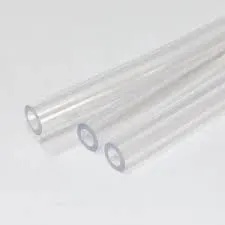ມ.ກ. . 23, 2025 04:04 Back to list
flexible pvc irrigation pipe
Flexible PVC irrigation pipes have become an essential component for modern agricultural and horticultural fields, providing innovative solutions to traditional watering methods. These pipes are crafted from polyvinyl chloride (PVC) and are lauded for their ability to combine flexibility with durability, making them a preferred choice among farmers and gardeners alike.
Authoritative studies conducted by agricultural institutions underscore the tangible benefits of using flexible PVC irrigation pipes. Research shows that systems employing this technology have reduced water loss through leaks and evaporation drastically. By optimizing water usage, farmers can achieve more sustainable practices, contributing positively to environmental conservation efforts. These findings are pivotal in promoting wider adoption of flexible PVC pipes within the agricultural community, as they highlight not only cost-efficiency but also ecological responsibility. Trust is a critical component when selecting irrigation solutions, and flexible PVC pipes stand out due to their proven track record of durability and efficiency. End-users have consistently reported satisfaction with the longevity and performance of their irrigation systems, bolstered by flexible PVC components. These testimonials, alongside empirical evidence, foster a sense of reliability that encourages others to make the shift towards flexible PVC solutions. In conclusion, flexible PVC irrigation pipes represent a significant evolution in farming and gardening methodologies. Through their adaptable nature, easy installation, engineering excellence, and supported by authoritative research, they offer a trustworthy solution addressing both the challenges of modern agriculture and the quest for more sustainable practices. As agricultural demands continue to grow, these pipes offer a robust, reliable, and resource-efficient means of ensuring that every farm and garden can thrive.


Authoritative studies conducted by agricultural institutions underscore the tangible benefits of using flexible PVC irrigation pipes. Research shows that systems employing this technology have reduced water loss through leaks and evaporation drastically. By optimizing water usage, farmers can achieve more sustainable practices, contributing positively to environmental conservation efforts. These findings are pivotal in promoting wider adoption of flexible PVC pipes within the agricultural community, as they highlight not only cost-efficiency but also ecological responsibility. Trust is a critical component when selecting irrigation solutions, and flexible PVC pipes stand out due to their proven track record of durability and efficiency. End-users have consistently reported satisfaction with the longevity and performance of their irrigation systems, bolstered by flexible PVC components. These testimonials, alongside empirical evidence, foster a sense of reliability that encourages others to make the shift towards flexible PVC solutions. In conclusion, flexible PVC irrigation pipes represent a significant evolution in farming and gardening methodologies. Through their adaptable nature, easy installation, engineering excellence, and supported by authoritative research, they offer a trustworthy solution addressing both the challenges of modern agriculture and the quest for more sustainable practices. As agricultural demands continue to grow, these pipes offer a robust, reliable, and resource-efficient means of ensuring that every farm and garden can thrive.
Share:
Latest news
-
Premium PVC Round Rods: Durable, Chemical Resistant, Easy to Machine
NewsAug.11,2025
-
PP U-channel: Chemical-Resistant, Lightweight & Durable
NewsAug.10,2025
-
Transparent PVC Pipe: Clear Flexible Tubing for Fluids
NewsAug.09,2025
-
Durable PP Rigid Sheet: Versatile & High-Quality Plastic Panels
NewsAug.08,2025
-
Premium Glossy PP Rigid Sheet – Durable & Versatile
NewsAug.07,2025
-
High-Quality HDPE Sheet | Durable Plastic Panels
NewsAug.06,2025

